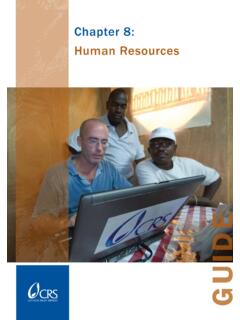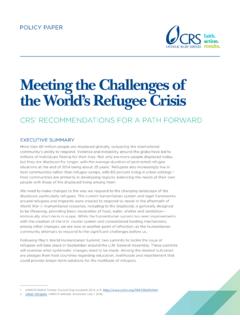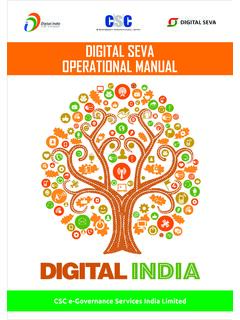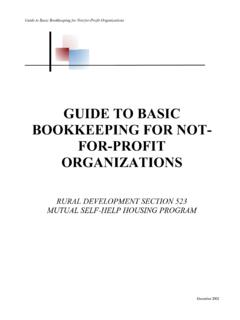Transcription of Introduction to SMART Skills for rural development
1 Catholic Relief Services 228 W. Lexington Street, Baltimore, MD 21201, USA For more information, contact SMART Skills MANUALA SMART Skills MANUALI ntroduction to SMART Skills for rural developmentIntroduction to SMART Skills for rural developmentA SMART Skills MANUALF armers in developing countries need a range of Skills in order to improve their livelihoods. They need to get organized into groups, understand how to use their natural resources in a sustainable way, and market their produce profitably and effectively. They also need to manage their finances, save money and organize credit, all while identifying, testing and adopting innovations. Together, these are Skills for Marketing and rural Transformation ( SMART Skills ).
2 They enable a group of farmers to make the most of their manual introduces field agents, extension workers and program managers to the SMART Skills approach. The six lessons cover the following topics: Using a Skills -based approach A closer look at the SMART Skills Organizing the team Working with the community Ensuring sustainability Building a training lesson includes guidelines, exercises to do with team members or with a group of farmers , and quizzes to test your is one manual in a series on SMART Skills . Other manuals in this series cover individual Skills in to SMART Skills for rural developmentINTRODUCTION TO SMART Skills FOR rural development IIntroduction to SMART Skills for rural developmentA SMART Skills MANUALii Introduction TO SMART Skills FOR rural DEVELOPMENTThis publication was made possible by the generous support of the American people through the United States Agency of International development (USAID) Office of Acquisition and Assistance under the terms of Leader with Associates Cooperative Agreement No.
3 AID-OAA-L-10-00003 with the University of Illinois at Urbana Champaign for the Modernizing Extension and Advisory Services (MEAS) Project. MEAS aims at promoting and assisting in the modernization of rural extension and advisory services worldwide through various outputs and services. The services benefit a wide audience of users, including developing country policymakers and technical specialists, development practitioners from NGOs, other donors, and consultants, and USAID staff and Relief Services (CRS) serves the poor and disadvantaged overseas. Without regard to race, creed or nationality, CRS provides emergency relief in the wake of natural and man-made disasters and promotes the subsequent recovery of communities through integrated development interventions.
4 CRS programs and resources respond to the Bishops call to live in solidarity as one human family across borders, over oceans, and through differences in language, culture and economic condition. CRS provided co-financing for this Relief Services 228 West Lexington Street Baltimore, MD 21201-3413 USA Editorial teamShaun FerrisRupert BestPaul MundyLayout and designPaul MundyIllustrationsJorge Enrique Guti rrez Contributions fromDina BrickGaye BurpeeGeoff HeinrichKathy YounkerISBN-10: 1614921407 ISBN-13: 978-1-61492-140-0 Download this publication and related material at or at citation: CRS and MEAS. 2015. Introduction to SMART Skills for rural development : A SMART Skills manual .
5 Catholic Relief Services, Baltimore, MD, and Modernizing Extension and Advisory Services project, University of Illinois at Urbana-Champaign, IL. 2015 Catholic Relief Services and MEAS project. This work is licensed under a Creative Commons Attribution Unported are free: to Share to copy, distribute and transmit the work to Remix to adapt the workunder the condition that they attribute the author(s)/institution (but not in any way that suggests that the authors/ institution endorse the user or the user s use of the work). Introduction TO SMART Skills FOR rural development IIIT able of contentsList of tables ..ivForeword ..vAcknowledgments ..xIntroduction.
6 XiLESSONS ..1 Lesson 1. Using a Skills -based approach ..3 Quiz 1 ..12 Lesson 2. A closer look at the SMART Skills ..13 Quiz 2 ..22 Lesson 3. Organizing the team ..23 Quiz 3 ..36 Staff Exercise A. Assessing the Skills of the field staff ..37 Lesson 4. Working with the community ..39 Quiz 4 ..52 Exercise 4a. Focus groups ..53 Exercise 4b. Crossing a river ..54 Exercise 4c. Visioning ..56 Lesson 5. Ensuring sustainability ..59 Quiz 5 ..66 Lesson 6. Building a training plan ..67 Quiz 6 ..84 ANSWERS TO QUIZZES ..85 REFERENCES AND FURTHER READING ..89iv Introduction TO SMART Skills FOR rural DEVELOPMENT1 Traditional vs participatory training ..272 Example scores from training needs assessment of team members.
7 373 Assessment form for SMART Skills ..384 Possible start-up meetings and field work with communities ..415 Form for converting a long-term vision into short-term action ..586 Skills and assets often used in multiple-disciplinary projects ..617 Example of providing fruit-tree seedlings ..658 Calendar showing key project dates and seasons ..689 Monthly schedule for training by a field agent ..7110 Spreadsheet showing numbers of field agents and farmers to be trained ..7311 Outline annual training timetable ..7512 Example of a training plan for a farmers group ..7613 Form for evaluating the Skills of farmers groups ..7814 Example of scores for a farmer group s Skills over 5 years.
8 79 List of tablesINTRODUCTION TO SMART Skills FOR rural development VForeword La Esperanza is a savings and loans group of 11 women and one man in Estel , Nicaragua. Formed in 2010, the group used a part of their savings to invest in producing vegetables on a one-quarter manzana ( ha) drip-irrigated plot. The group sells their produce at the Friday market in Estel and to other villagers. They earn around US$ 50 a week from selling their produce, a welcome income for the members. The members get paid for the time they spend working on the vegetable plot. The group s manager is also paid for her efforts in organizing and running the group. These payments are important incentives that enhance the stability and growth of their business.
9 The group wants to double the size of its plot and is exploring the possibility of selling its produce to a supermarket in Esperanza is an example of a new way of combating poverty in vulnerable rural communities by helping them engage with markets. To do this, the group members need various types of Skills . Here are the main ones: Organizational management: the group members need to plan and monitor the per-formance of their work. Financial Skills : they need to save money, invest it in the enterprise, and maintain financial records. market and enterprise Skills : they need to produce something that customers want to buy; they need to find those customers; and they need to plan their business to make a profit.
10 Natural resources: they need to conserve their soil, water and other natural resources so they can produce on a sustainable basis. Innovation: they need to find new, more efficient and more profitable ways of doing things. In common with many other development agencies, CRS is incorporating a multi-disciplinary approach into its development efforts. We realize that increasing food production alone cannot move poor rural people permanently out of poverty. Building the capacity of smallholders means helping rural communities to work together effectively, manage their money and natural resources, engage in profitable enterprises and learn how to innovate. These are all important elements in a successful and more sustainable agricultural development strategy.












